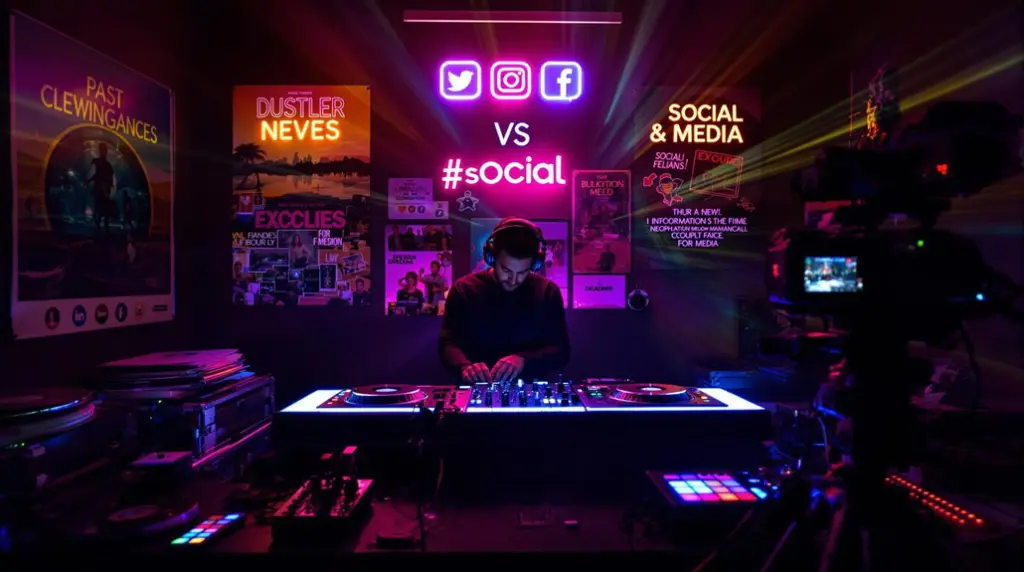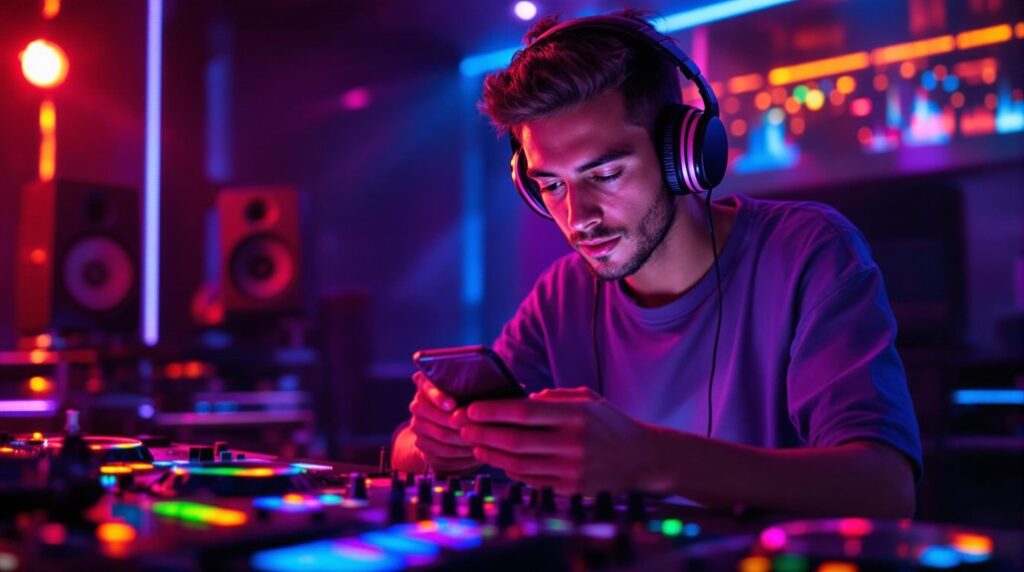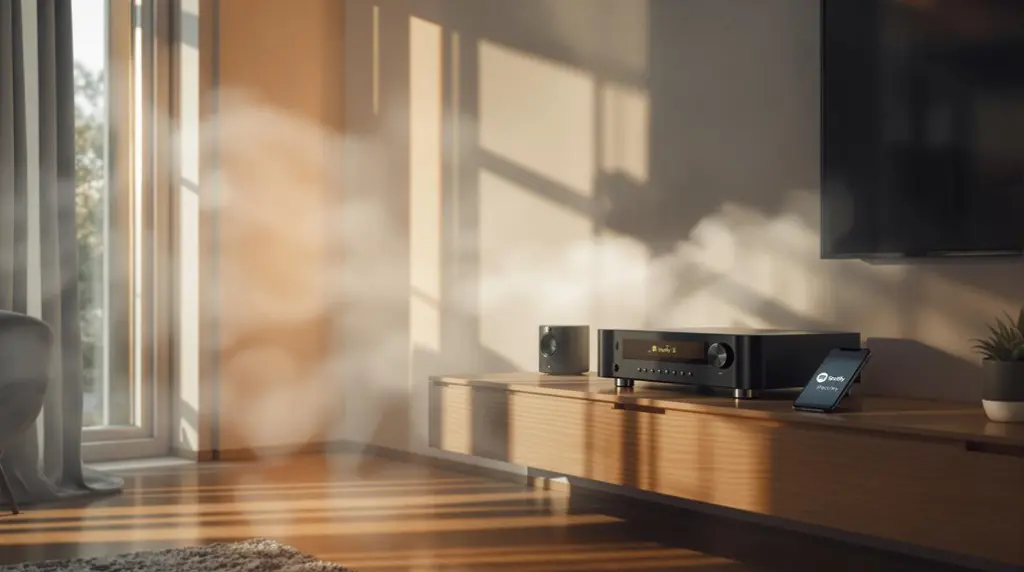For new DJs, understanding essential DJ gear is pivotal for mastering your craft. The basic setup can range from a minimal combination of a laptop and DJ software, to traditional turntables paired with a mixer for tactile control. DJ controllers merge these functions into one user-friendly device, while all-in-one systems offer integrated decks and mixers for independent operation. Essential equipment includes DJ controllers, mixers, high-isolation headphones like the Sennheiser HD 25 Plus, and monitor speakers such as the Mackie CR4-X. Investing wisely while considering both functionality and budget will set you up for success and uncover deeper insights into the DJ industry.
Key Takeaways
- Entry-level DJ controllers like Pioneer DDJ-200 are budget-friendly and user-friendly for beginners.
- DJ headphones are crucial for accurate cueing and monitoring; consider models like Sennheiser HD 25 Plus.
- A laptop with DJ software is essential for managing music libraries and performing digital DJing.
- Studio monitor speakers, such as Mackie CR4-X, provide sound clarity for precise mixing.
- Renting DJ gear can be a cost-effective way to try out high-quality equipment before purchasing.
Types of DJ Setups
When exploring the various types of DJ setups, it is essential to understand the range of equipment configurations available to suit different skill levels, performance needs, and budgets. DJ setup comparisons reveal multiple options catering to both beginners and seasoned professionals.
A minimal setup, comprising just a laptop and DJ software, is an affordable and portable solution for novice DJs to start mixing music. This setup offers a low barrier to entry, making it ideal for those new to the craft. Additionally, opting for user-friendly DJ controllers can further simplify the learning curve, providing intuitive controls and seamless software integration.
On the other hand, a classic approach involves traditional DJ setups with two turntables and a mixer. This configuration allows for hands-on manipulation and scratching techniques, providing a tactile experience that many DJs prefer. DJ controllers, which merge turntable and mixer functionalities into one device, offer a user-friendly interface with built-in controls, thereby connecting seamlessly to DJ software on a laptop. This option provides enhanced flexibility and convenience.
All-in-one DJ systems integrate decks and mixers into a single unit, enabling DJs to perform independently using USB drives, a feature particularly beneficial for mobile setups. Models like the Pioneer DDJ-200 and DDJ-400 exemplify entry-level options designed specifically for beginners, offering intuitive controls and access to performance software to facilitate skill development.
Essential DJ Equipment
Mastering the art of DJing requires a thorough understanding of essential DJ equipment, which forms the backbone of any successful performance setup. Central to this setup is the DJ controller, which integrates the functions of traditional turntables and mixers, enabling real-time music manipulation and seamless track mixing. Notable models offer intuitive interfaces and extensive connectivity options.
For instance, the Hercules DJControl Inpulse 500 is known for its affordability and feature-rich design, making it ideal for beginners. A quality DJ mixer, such as the Numark M2 or Behringer DJX750, is indispensable for shifting between audio tracks and applying effects. These mixers provide robust equalization controls and multiple input channels, guaranteeing versatility during live performances.
DJ headphones, like the Sennheiser HD 25 Plus, are essential for accurate cueing and monitoring. Their ability to isolate sound in noisy environments guarantees precise beat matching and track selection.
Complementing headphones are monitor speakers, such as the Mackie CR4-X, which deliver sound clarity, allowing DJs to evaluate their mixes accurately.
Additionally, a laptop equipped with DJ software like Serato, Traktor, or Virtual DJ is key for managing music libraries and facilitating digital DJing.
For peak performance, regular DJ gear maintenance is critical, including cleaning connectors and updating firmware. Performance tips include mastering the use of each piece of equipment and continuously practicing to improve technical skills and creativity.
Input Devices and Controllers
How do DJs seamlessly blend tracks and create enchanting music experiences? The answer lies in mastering input devices and controllers, which form the backbone of any DJ setup. Input devices range from traditional turntables for vinyl aficionados to CD decks for affordable setups, and USB-enabled devices for digitizing analog vinyl collections.
DJ controllers have revolutionized the industry by mimicking the functions of both turntables and mixers. They integrate essential controls such as knobs, jog wheels, faders, and buttons, offering enhanced flexibility for digital setups. For example, the Rane DJ ONE Professional Controller is renowned for its functionality, sound quality, and compatibility with various DJ software, making it a versatile choice for professionals.
A Digital Vinyl System (DVS) enables DJs to use traditional turntables while integrating modern DJ software, bridging the gap between analog and digital formats. Controllers like the Pioneer DDJ-200 and DDJ-400 are tailored for beginners, providing access to performance software and essential features necessary for effective mixing.
Here is a comparison of popular input devices and controllers:
| Device | Key Features | Ideal For |
|---|---|---|
| Turntables | Authentic vinyl feel, manual control | Vinyl enthusiasts |
| CD Decks | Affordable, versatile | Budget setups |
| USB Devices | Digital-analog integration | Modern DJs |
| Rane DJ ONE | High functionality, sound quality | Professional DJs |
| Pioneer DDJ-200/400 | Beginner-friendly, essential features | New DJs |
Understanding these devices and their controller features is vital for any aspiring DJ to master turntable techniques and create flawless sets.
Sound System and Connectivity
Why is an impeccable sound system indispensable for a DJ? The quality of sound delivery is the cornerstone of any successful DJ set, whether in a studio or a live venue.
Studio monitor speakers, such as the Mackie CR4-X, are essential for providing a clear and accurate sound representation. This accuracy is significant for skill development and mixing refinement, enabling DJs to make precise adjustments to their sets.
Additionally, conducting thorough sound check procedures guarantees that all connections and cables are functioning at their best, preventing audio dropouts during performances.
Most venues are equipped with professional PA systems, eliminating the need for DJs to invest heavily in extensive personal sound equipment for live performances.
However, understanding the nuances of connectivity options is critical for seamless integration of various devices into your setup. Key connectivity options to take into account include:
- Aux inputs: Facilitate easy connection with a variety of devices.
- USB 2.0 connections: Essential for integrating audio interfaces like Native Instruments KOMPLETE AUDIO 1, which guarantees high-quality audio output.
- Signal routing: Integral for connecting turntables, mixers, and speakers to maximize audio clarity and minimize noise.
Audio interfaces play a key role in enhancing sound quality and connectivity.
Cost Considerations
Understanding the intricacies of sound system and connectivity is only one part of the equation; financial planning is equally important for aspiring DJs. Crafting a budget that aligns with your goals and resources is essential. Initial investment in DJ gear can vary considerably, ranging from a few hundred to a couple thousand dollars.
For those on a tighter budget, entry-level DJ controllers are an excellent starting point, priced between $100 and $600. Professional headphones, vital for monitoring and mixing, typically cost between $100 and $300, with budget-friendly options also available. Studio monitor speakers are indispensable for accurate sound reproduction, starting at around $150 per pair and scaling up to over $1,000 for high-end models.
A strategic approach includes exploring rental options. Renting allows beginners to experiment with different brands and setups without a hefty financial commitment. This strategy provides the flexibility to identify the best fit before making a purchase.
Here’s a snapshot of cost considerations:
| Equipment | Price Range |
|---|---|
| Entry-Level DJ Controller | $100 – $600 |
| Professional Headphones | $100 – $300 |
| Studio Monitor Speakers | $150 – $1,000+ |
| Total Beginner Setup | $350 – $1,900+ |
| Renting (per event) | Varies |
Adopting these budget tips and rental options can streamline the financial aspect of your DJ journey, ensuring that you invest wisely.
Frequently Asked Questions
What Equipment Do You Need as a Beginner DJ?
As a beginner DJ, essential equipment includes portable controllers, beginner mixers, and high-quality headphones. Utilize DJ software to manage music libraries and consider reliable audio interfaces and speaker options for accurate sound reproduction during practice and live performance.
What Kit Do You Need to Be a DJ?
To be a DJ, essential DJ gear includes a DJ controller, high-quality mixer, reliable headphones like the Sennheiser HD 25 Plus, studio monitor speakers, and a laptop with DJ software. This setup guarantees superior sound quality, refined mixing techniques, and seamless live performances.
What Equipment Do Modern DJS Use?
Modern DJs utilize digital mixers, portable controllers, and high-quality sound interfaces. Performance software like Serato and Traktor is essential for mixing and effects. Additionally, professional headphone types and accurate speaker systems are vital for refining sound quality.
What Do I Need to Set up as a DJ?
To set up as a DJ, you’ll need a DJ controller or turntables, a mixer, high-quality headphones, monitor speakers, and a laptop with DJ software options. Additionally, consider audio interface choices to guarantee peak sound quality during performances.
Conclusion
In conclusion, the acquisition of fundamental DJ equipment, including various setups, input devices, controllers, and sound systems, is essential for aspiring DJs. Understanding the technical specifications and connectivity options enhances performance capabilities. Additionally, a thorough evaluation of cost considerations guarantees a balanced investment in quality gear. Mastery of these elements forms the foundation for proficiency in DJing, enabling both creative expression and technical excellence within the discipline.




